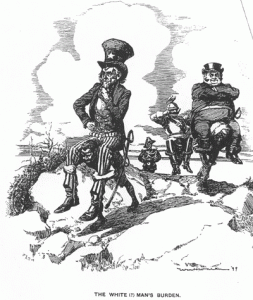This is a guest post by Bianca Harrisskitt, one of IHR Digital’s interns from the University of Leicester.

“The White (?) Man’s Burden”. Satire of Kipling’s phrase shows the “white” colonial powers being carried as the burden of their “colored” subjects. First printed in Life, March 16, 1899.
(wikipedia)
In March 2010, Professor Francisco Bethencourt delivered an enlightening lecture on the development of racism, part of a larger project aiming to chart the development of racism from the Crusades to the mid-nineteenth century. As Professor Bethencourt points out, race does not exist from a biological point of view, rather it exists in the views of people and the way that they choose to classify and rank humankind. Focussing mainly on the nineteenth century, but with reference to earlier time periods, the speaker outlines the development of theories which aimed to classify human beings along the lines of ‘race’, exhibiting a phenomenon we now call racism.
Professor Bethencourt firstly explains that racism and race theory existed before the nineteenth century, citing Benjamin Isaac’s book ‘The Invention of Racism in Classical Antiquity’, which analyses racism in the Greek and Roman worlds. Furthermore, he goes on to explain that the first definitions of the hierarchy of the human race were based on the allegorical personification of the continents in the 16th century. Whilst the Crusades had placed Jerusalem at the centre of world, rapid European expansion was starting to place Europe at the epicentre, giving rise to Eurocentricism and theories of white supremacy.
However, whilst theories of race may have existed before the nineteenth century, there was a vast expansion of the field during this time period and Professor Bethencourt aims to summarise its main sources of inspiration, looking at the work produced by scholars such as Blumenbach, Camper, James Prichard and Robert Knox. The speaker stresses that the scholarship begins to express more inherently racist themes and ideals from the 1840s onwards, pointing to Robert Knox as a representation of the mainstream naturalists who became prominent in the mid nineteenth century.
Professor Bethencourt accepts that his material is still raw, and he does not cover the work of Rousseau, Darwin, De Gobineau and a number of other prominent scholars in his lecture. Nevertheless, his conclusions thus far are clear: theories of race developed in the 16th century but intensified and expanded in the nineteenth century. The complex definition of race by early nineteenth century scholars such as Blumenbach and Prichard resulted from the increasing complexity of ethnographic research worldwide and whilst the supremacy of white standards was never disputed, these scholars stressed the perfectibility of all races. However, a profoundly racist trend emerged in the 1840s which denied the perfectibility of non-European people and confirmed prejudices against mixed race people, which Professor Bethencourt concludes inspired and facilitated the Holocaust, one of the most notable and horrific displays of racism in living memory.
